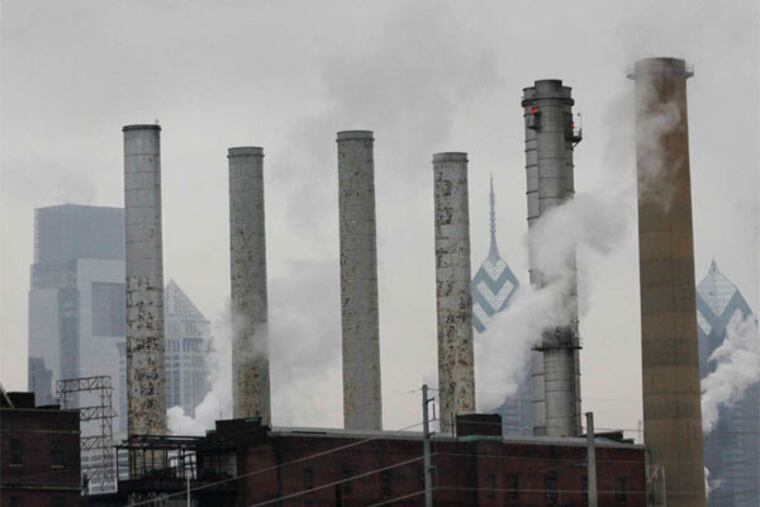An emergency fuel-oil rescue for key plant on Center City steam loop
A key power plant on the Center City steam loop that supplies the area around Thomas Jefferson University Hospital ran perilously short of fuel oil last week, prompting state and local officials to help arrange a rescue.

A key power plant on the Center City steam loop that supplies the area around Thomas Jefferson University Hospital ran perilously short of fuel oil last week, prompting state and local officials to help arrange a rescue.
Veolia Energy officials said a new oil supplier failed to deliver fuel to its Edison Station plant at 908 Sansom St., which provides high-pressure steam to the eastern part of Veolia's district heating system.
Michael Smedley, Veolia's regional vice president, said the system that serves dozens of city hospitals, universities, and Center City office towers was in no danger of losing heat. Most of the system is supplied from Veolia's large Grays Ferry power plant, which has an ample supply of natural gas.
But the city's Office of Emergency Management and the Pennsylvania Public Utility Commission were called in, and hospitals were put on notice about a possible outage. Philadelphia Energy Solutions made two emergency barge deliveries totaling 24,000 barrels of heavy fuel oil from its South Philadelphia refinery up the icy Schuylkill to Veolia's fuel tanks in Grays Ferry.
"We thought it was kind of odd at the eleventh hour getting called in on a rescue mission," said Philip L. Rinaldi, chief executive officer of the refinery.
The episode is emblematic of how the bitter winter weather is pushing the region's energy systems to their limits. Electricity demand is setting records. Propane supplies are scarce. Natural-gas prices are ablaze.
Utilities are warning customers to brace for bigger bills next month that reflect high consumption of electricity and natural gas.
Customers who use heating oil and propane also can expect shocks, especially if they are not in a fixed-price contract.
"If you didn't lock in with your heating-oil supplier last summer, your December bill was unpleasant and your January bill will be doubly unpleasant," said Stephen Shork, a Villanova energy trader and editor of the Shork Report.
Shork said anything containing energy right now is fetching a high price - heating oil, natural gas, even municipal trash for fuel in incinerators.
"Demand is up, no question about it," said Roy Patterson, executive vice president of the Delaware Valley Fuel Dealers Association. "The biggest problem we're having is big lines at fuel terminals, waiting to pick up fuel."
Propane prices have soared in recent months because of pipeline constraints and shortages of fuel blamed on a wet harvest in the Midwest, where farmers use propane to dry grain.
Spot-market prices for electricity in the region shot above $1,800 a megawatt hour on Jan. 7, more than 45 times a typical daily price. PJM Interconnection, the regional grid operator, said eight of its highest 10 winter peak days have been set this month, said Paula DuPont-Kidd, a PJM spokeswoman.
High energy prices will hurt buyers who are not locked in to long-term deals. On the flip side, the spot-market prices are an opportunity for suppliers who can provide power on short notice.
SEPTA, the regional transit agency, said it has earned $47,000 this month by selling power stored in a massive battery array installed in 2012 that captures power from braking rail cars on the Market-Frankford Line.
"We've made about 35 percent of what we hope to make the whole year," said Andrew Gillespie, chief engineer.
Competition for fuel supply was at the heart of Veolia's steam-loop crisis.
Veolia's fuel supplier for decades, Hess Corp., got out of the business on short notice in December, Smedley said. Replacement suppliers were found, but Veolia was not a firm customer.
When the cold hit last week, other industrial users switched to the heavy No. 6 heating oil Veolia uses at its Edison Station. After Veolia received no deliveries for two days, Smedley called the city on Jan. 23.
Michael Resnick, the city's director of public safety, and Samantha Phillips, the director of the Office of Emergency Management, called Veolia's predicament a "perfect storm" of bad weather and short supply.
Veolia found trucks to transfer oil stored at Grays Ferry to Edison Station. The refinery's barge deliveries this week replenished emptied tanks in Grays Ferry.
Hospitals, which had put plans into place in case they ran short of steam for heating, cooking, and sterilization, on Thursday were told to stand down.
215-854-2947 @maykuth